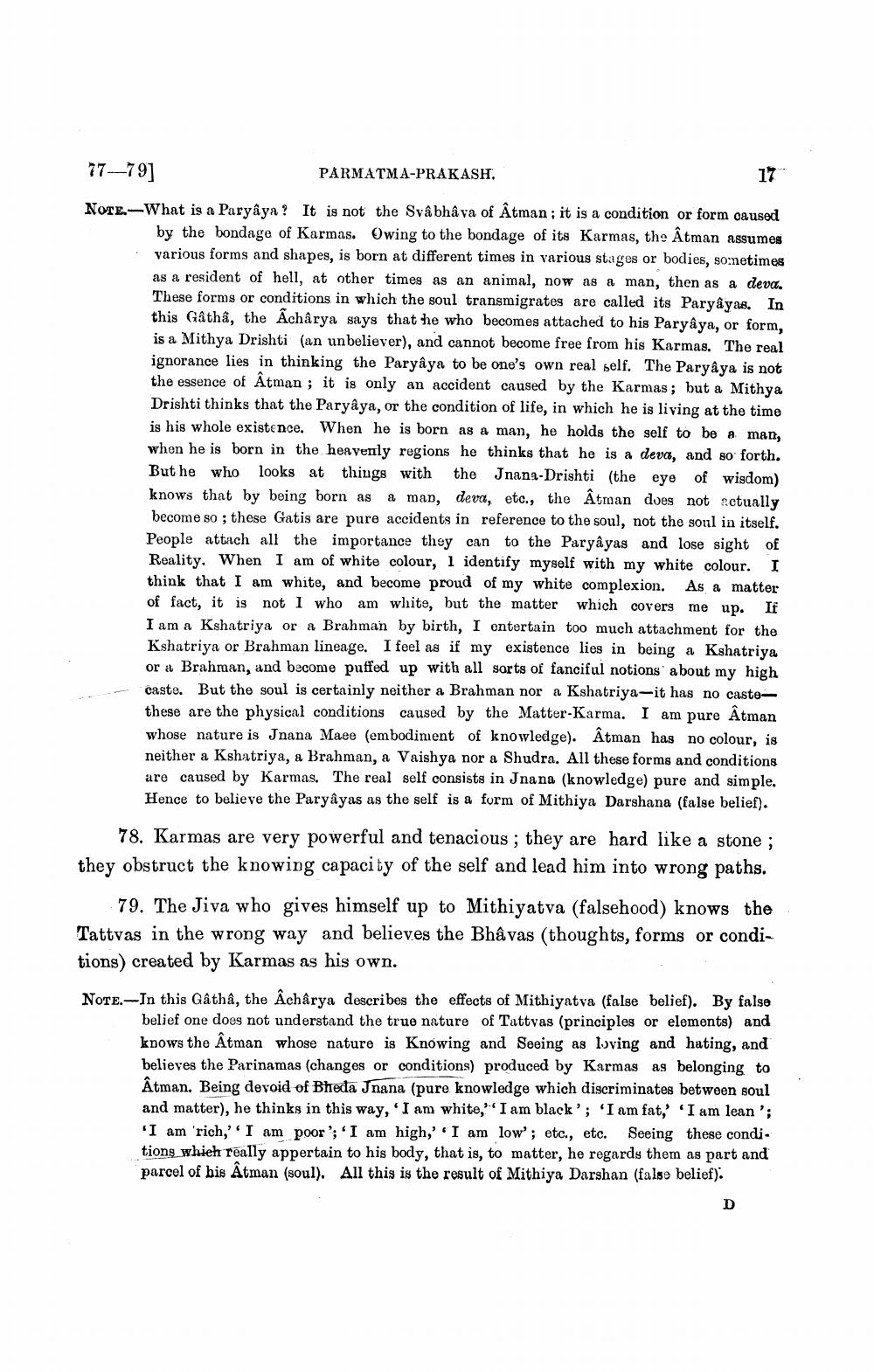________________
77479]
PARMATMA-PRAKASH,
17
NOTE:-What is a Paryâya ? It is not the Svâbhâ va of Atman; it is a condition or form caused
by the bondage of Karmas. Owing to the bondage of its Karmas, the Atman assumes various forms and shapes, is born at different times in various stages or bodies, sometimes as a resident of hell, at other times as an animal, now as a man, then as a deva. These forms or conditions in which the soul transmigrates are called its Paryâyas. In this Gâthâ, the Acharya says that he who becomes attached to his Paryâya, or form, is a Mithya Drishti (an unbeliever), and cannot become free from his Karmas. The real ignorance lies in thinking the Paryâya to be one's own real self. The Paryâya is not the essence of Atman ; it is only an accident caused by the Karmas; but a Mithya Drishti thinks that the Paryâya, or the condition of life, in which he is living at the time is his whole existence. When he is born as a man, he holds the self to be a man, when he is born in the heavenly regions he thinks that he is a deva, and so forth. But he who looks at things with the Jnana-Drishti (the eye of wisdom) knows that by being born as a man, deva, etc., the Atman does not actually become so ; these Gatis are pure accidents in reference to the soul, not the sonl in itself. People attach all the importance they can to the Paryâyas and lose sight of Reality. When I am of white colour, 1 identify myself with my white colour. I think that I am white, and become proud of my white complexion. As a matter of fact, it is not I who am white, but the matter which covers me up. If I am a Kshatriya or a Brahman by birth, I entertain too much attachment for the Kshatriya or Brahman lineage. I feel as if my existence lies in being a Kshatriya or a Brahman, and become puffed up with all sorts of fanciful notions about my high caste. But the soul is certainly neither a Brahman nor a Kshatriya-it has no castethese are the physical conditions caused by the Matter-Karma. I am pure Atman whose nature is Jnana Maee (embodiment of knowledge). Ātman has no colour, is neither a Kshatriya, a Brahman, a Vaishya nor a Shudra. All these forms and conditions are caused by Karmas. The real self consists in Jnana (knowledge) pure and simple. Hence to believe the Paryâyas as the self is a form of Mithiya Darshana (false belief).
78. Karmas are very powerful and tenacious; they are hard like a stone; they obstruct the knowing capacity of the self and lead him into wrong paths.
79. The Jiva who gives himself up to Mithiyatva (falsehood) knows the Tattvas in the wrong way and believes the Bhâvas (thoughts, forms or conditions) created by Karmas as his own.
Note. In this Gathâ, the Acharya describes the effects of Mithiyatva (false belief). By false
belief one does not understand the true nature of Tattvas (principles or elements) and knows the Atman whose nature is Knowing and Seeing as loving and hating, and believes the Parinamas (changes or conditions) produced by Karmas as belonging to Âtman. Being devoid of Bheda Jnana (pure knowledge which discriminates between soul and matter), he thinks in this way, 'I am white,'I am black'; 'I am fat,' 'I am lean'; 'I am 'rich,' I am poor ': 'I am high,' 'I am low'; etc., etc. Seeing these conditions which really appertain to his body, that is, to matter, he regards them as part and parcel of his Atman (soul). All this is the result of Mithiya Darshan (false belief).




